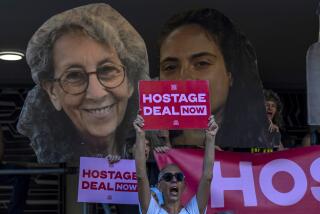Powell to Take Part in Sudan Peace Talks
NAIROBI, Kenya — Sudan’s civil war, one of Africa’s longest-running conflicts, may be nearing an end.
Top Kenyan officials, who are brokering peace talks between the Sudanese government and the main rebel group, said Secretary of State Colin L. Powell planned to arrive in Nairobi today to encourage both sides to reach a final agreement.
The conflict, which broke out again in 1983, has since claimed more than 2 million lives, mainly from disease and starvation. It pits the Muslim-dominated north against rebels in the south, where people practice Christianity and traditional African religions.
An unlikely alliance of activists -- from the religious right to the Congressional Black Caucus -- has pushed the Bush administration to get both parties to reach a final agreement. A peace deal could bolster President Bush’s reelection hopes, analysts say.
With elements of the persecution and enslavement of the Christian minority by the Muslim government, the Sudan war has also become a hot issue for many American church groups, which have prayed and lobbied hard for a resolution to the conflict. Their prayers may soon be answered.
“We are very hopeful -- more hopeful than we have been in a long time -- that decisions will be reached,” said Kenyan retired Lt. Gen. Lazaro Sumbeiywo, who is heading the talks.
Some analysts who have followed the Sudan conflict for the last two decades say recent signs have suggested that both sides were willing to relent. In a long history of failed negotiations, meetings are taking place at the highest levels, with face-to-face discussions between John Garang, head of the Sudan People’s Liberation Movement, and Sudanese Vice President Ali Uthman Muhammad Taha.
The high point of the talks came last month when the two men told their delegations and mediators to leave the conference room in the Kenyan resort town of Naivasha. They consulted alone for 20 hours within one week.
Both sides, who signed a cease-fire agreement a year ago, have settled their most contentious issue: the redeployment of government and rebel combatants. The government will pull out most of its troops from the south, leaving only 12,000 soldiers. And the rebels have agreed to move most of their troops out of the north. Nearly 20,000 combatants from both sides will be integrated into a single army.
Both sides have much to gain from a peace deal.
The Khartoum government would petition Washington to be removed from its list of nations that sponsor terrorism. A peace deal will also allow Khartoum to exploit the country’s oil resources without attacks from rebels, who routinely target oil installations.
The rebels would gain more development aid from Washington, state revenues to improve infrastructure in the impoverished south and political legitimacy.
This week the Khartoum-based government and the Sudanese People’s Liberation Army will began to address how to share power and wealth, especially Sudan’s abundant oil reserves. The parties are also trying to determine who will govern contested areas around the Nuba Mountains, the Southern Blue Nile and Abyei. Another contentious issue centers on who will lead Sudan’s combined army.
Peace talks over Sudan have failed many times before, but observers and mediators say they are hoping for a final peace agreement by the end of the year.
That would initiate a six-year transition period during which the government would include Muslims and Christians, northerners and southerners.
According to one proposal, the rebel leader Garang would be installed as a first vice president alongside current President Omar Hassan Ahmed Bashir, who came to power in a 1989 coup. At the end of the transition period, people in southern Sudan would hold a referendum to determine whether the region would secede from Khartoum or remain a united country.
Sudan’s war has been described by Powell as one of the world’s most enduring tragedies. Nearly everyone involved in the peace negotiations agrees that it has been the United States that has pushed the parties farther down the road to peace than ever before.
Since 1993, Sudan has been a pariah state for its harboring of Osama bin Laden, Middle Eastern militants and terrorists involved in the 1998 attacks on U.S. embassies in Tanzania and Kenya. President Clinton ordered a missile strike on a Khartoum pharmaceutical factory that was believed to have been producing biological weapons.
But after the attacks on the World Trade Center towers and the U.S. invasion of Afghanistan, the Khartoum government squelched many of the most extremist elements in the country, including Al Qaeda.
Last year, Bush signed the Sudan Peace Act, which will allocate $100 million over three years to areas outside the Sudanese government’s control. The funds are conditional, however, on the good faith of the peace negotiators.
The bill comes up for renewal by the end of this month.
Bush was interested in Sudan even before Sept. 11, 2001, said Franklin Graham, president of the church-based Samaritan’s Purse international relief organization.
At one campaign stop in 2000, Graham, the son of Billy Graham, told Bush that the Sudanese government had repeatedly bombed a Samaritan’s Purse hospital in southern Sudan.
“To my amazement, he was quite knowledgeable about the subject,” Graham said. “He said something to the effect of: ‘I’ve followed that. I’m aware of it and when I become president I want to help resolve that situation.’ ”
The stakes for the talks couldn’t be higher. Failure could lead to years of war. But an armistice could be a boon to the region as roads and oil pipelines could run between Sudan, Ethiopia, Kenya and Uganda.
More to Read
Sign up for Essential California
The most important California stories and recommendations in your inbox every morning.
You may occasionally receive promotional content from the Los Angeles Times.










